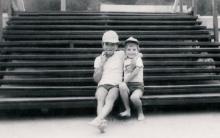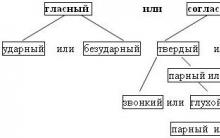Glinka Mikhail Ivanovich - famous Russian composer.
Biography
Childhood
Father, Ivan Nikolaevich, was a retired captain, originally from the nobility. The mother, Evgenia Andreevna, from the very birth of her son was removed from his upbringing by her domineering mother-in-law, Fyokla Alexandrovna. The grandmother took too much care of her grandson, making him sickly and untouchable by the age of 6. In 1810, Fyokla Alexandrovna dies, and Misha returns to his father’s house to be raised.
Education
Mikhail began learning to play the violin and piano from childhood. He was taught this by a governess discharged from St. Petersburg, Varvara Fedorovna Klammer. Then the boy is sent to the St. Petersburg Noble Boarding School at the Pedagogical Institute. Here Wilhelm Kuchelbecker becomes his tutor. Glinka takes lessons from excellent music teachers - John Field, Karl Zeiner. It is here that Glinka meets A.S. Pushkin, which develops into friendship until the end of the poet’s days.
Creative path
Music becomes a calling for Glinka immediately after graduating from boarding school: he actively studies the history of Western European music and performs in salons. He composed his first successful works: variations for piano and harp, romances, string septet, rondo for orchestra, orchestral overtures. His circle of acquaintances includes Zhukovsky, Griboyedov, Mitskevich, Delvig, Odoevsky.
He is vacationing in the Caucasus. And in 1824 he got a job at the Main Directorate of Communications as an assistant secretary. By the end of the 20s, together with Pavlishchev, he published the “Lyrical Album”, which included his own compositions.
Since 1830, the Italian period begins in Glinka’s life and work, preceded by a short summer trip in Germany. Milan at that time was the center of the world musical culture. Here Mikhail Ivanovich meets G. Donizetti and V. Bellini, studies bel canto and begins to compose himself in the “Italian spirit.”
Since 1833, Glinka settled in Germany, where he continued to hone his musical talent with Siegfried Dehn. His studies in 1834 are interrupted by the news of his father's death, and Glinka returns to Russia.
He dreams of creating a Russian national opera, and as the plot he chooses a historical moment - the feat of Ivan Susanin. The composer worked on it for almost three years, and finally, in 1836, the grandiose opera was completed, called “A Life for the Tsar.” Its production on the stage of the St. Petersburg Bolshoi Theater was successful: the opera was received with delight in society. After this success, Glinka was even appointed bandmaster Court Chapel. In 1838, Glinka rests and works in Ukraine.
In 1842 she saw the light New Opera Glinka, “Ruslan and Lyudmila,” which caused heated discussions in society.
In 1844, Glinka set off on a new trip abroad: first to France, and then to Spain. In Paris, Berlioz himself performs his works. In 1845, Glinka gave a great a charity concert in Paris, after which he goes to Spain. Here he creates symphonic overtures on Spanish folk themes, as well as the Aragonese Jota overture.
In 1847, Glinka returned to Russia, then went to Warsaw, where he created his famous “Kamarinskaya”, which became a completely new type symphonic music, which combines different rhythms, characters and moods. In 1848, “Night in Madrid” appears.
Since 1851, Glinka has lived in St. Petersburg, giving singing lessons, writing new opera parts. Under his influence, a Russian vocal school is emerging here.
In 1852, Glinka wanted to go on a trip to Spain, but the road tired him, and he stopped in Paris for two whole years. Here he is working on the symphony “Taras Bulba”, which remained unfinished.
In 1854, Glinka returned to Russia and began writing “Notes,” memoirs.
In 1856, Glinka left for Berlin.
Personal life
In 1835, Glinka married his distant relative, Maria Petrovna Ivanova, with whom the marriage was completely unsuccessful.
In 1838, Glinka met Ekaterina Ermolaevna Kern, whom she loved until the end of her days, dedicating her best works to her.
Death
Glinka died in Berlin on February 15, 1857. He was buried there, in the Lutheran cemetery, but a few months later his ashes were transported to Russia and reburied in St. Petersburg at the Tikhvin cemetery.
Glinka's main achievements
- Glinka became the founder of the Russian national composer school.
- His compositions had a strong influence on the further development of Russian music and on such composers as A. S. Dargomyzhsky, members of the " Mighty bunch", P. I. Tchaikovsky, who developed in their musical works his ideas.
- The first creator of Russian national opera(“Life for the Tsar”).
- Under the influence of Glinka, a Russian vocal school emerged in St. Petersburg.
Important dates in Glinka's biography
- 1804 - birth
- 1804–1810 - raised by grandmother
- 1814 - begins to study music with Klammer
- 1817–1822 - studied at the St. Petersburg Noble Boarding School at the Pedagogical Institute
- 1823 - trip to the Caucasus
- 1824–1828 - work as an assistant secretary in the Main Directorate of Railways
- 1829 - publication " Lyrical album A"
- 1830 - Italian period, Milan
- 1833 - German period, Berlin
- 1834 - death of father, return to Russia
- 1835 - marriage to M. P. Ivanova
- 1836 - opera " Life for the Tsar»
- 1836–1838 - conductor of the court singing chapel
- 1838 - trip to Ukraine, meeting E. E. Kern
- 1842 - opera " Ruslan and Ludmila»
- 1844 - trip to France
- 1845 - charity concert in Paris, trip to Spain, overture " Aragonese jota»
- 1847 - " Kamarinskaya»
- 1848 - overture " Night in Madrid»
- 1851 - life in St. Petersburg
- 1852–1854 - life in Paris
- 1854 - return to Russia
- 1856 - life in Berlin
- 1857 - death
- A year before Mikhail was born, the family had a son who died in infancy. Fyokla Aleksandrovna, the grandmother, blamed Glinka’s mother, Evgenia Andreevna, for this death, and with her unbridled autocracy that she possessed in the family, she took her newborn grandson to be raised by her.
- Justina Kuchelbecker, Native sister the same Wilhelm, married cousin the composer's father, Grigory Andreevich Glinka.
- Glinka's wife, Maria Petrovna, was completely uneducated and understood nothing about music. She had no idea who Beethoven was.
- When the composer’s ashes were transported from Berlin to St. Petersburg, the coffin was packed in cardboard, on which was written in large letters: “PORCELAIN.”
- The patriotic song to Glinka's music was an anthem Russian Federation from 1991 to 2000.
Founder of Russian classical music, Russian bel canto. M.I. Glinka was born on June 1, 1804 in the village of Novospasskoye, on the estate of his parents, which belonged to his father - retired captain Ivan Nikolaevich Glinka - located one hundred versts * from Smolensk and twenty versts * from small town Yelny. From 1817 Glinka lived in St. Petersburg. He studied at the Noble boarding school at the Main Pedagogical School (its tutor was the poet, Decembrist V.K. Kuchelbecker). He took piano lessons from J. Field and S. Mayer, and violin lessons from F. Boehm; later he studied singing with Belloli, composition theory with Z. Dehn. In the 20s In the 19th century he was famous among St. Petersburg music lovers as a singer and pianist. In 1830-33 Glinka traveled to Italy and Germany, where he met outstanding composers: G. Berlioz, V. Bellini, G. Donizetti. In 1836, Glinka became conductor of the Court Singing Chapel (retired from 1839).
Mastering the experience of domestic and world musical culture, the impact of progressive ideas that spread during the period Patriotic War 1812 and the preparation of the Decembrist uprising, communication with outstanding representatives of literature (A. S. Pushkin, A. S. Griboedov, etc.), art, and art criticism contributed to broadening the composer’s horizons and developing innovative aesthetic foundations for his work. Glinka’s work, folk-realistic in its aspiration, influenced the further development of Russian music.
In 1836, Glinka’s heroic and patriotic historical opera “Ivan Susanin” was staged on the stage of the St. Petersburg Bolshoi Theater. Contrary to the concept imposed on the composer (the libretto was compiled by Baron G. F. Rosen in the spirit of monarchical officialdom, at the insistence of the court the opera was called “A Life for the Tsar”), Glinka emphasized the popular origin of the opera, glorified the patriotic peasant, the greatness of character, courage and unbending fortitude of the people . In 1842, the premiere of the opera “Ruslan and Lyudmila” took place in the same theater. In this work, colorful pictures of Slavic life are intertwined with fairy-tale fantasy, distinctly Russian national traits with oriental motifs (this is where orientalism in Russian classical opera originates). Rethinking the content of Pushkin’s playful, ironic youth poem, taken as the basis for the libretto, Glinka brought to the fore the majestic images Ancient Rus', heroic spirit and multifaceted, emotionally rich lyrics. Glinka's operas laid the foundation and outlined the path for the development of Russian opera classics. “Ivan Susanin” is a folk musical tragedy based on a historical plot, with intense, effective musical and dramatic development, “Ruslan and Lyudmila” is a magical opera-oratorio with a measured alternation of wide, closed vocal-symphonic scenes, with a predominance of epic, narrative elements. Glinka's operas approved global significance Russian music. In the field of theatrical music, Glinka’s music for N. V. Kukolnik’s tragedy “Prince Kholmsky” (post. 1841, Alexandrinsky Theater, St. Petersburg) has great artistic value. In 1844-1848. The composer spends his time in France and Spain. This trip confirmed the European popularity of the Russian genius. Berlioz became a great admirer of his talent, performing Glinka’s works at his concert in the spring of 1845. Glinka's original concert in Paris was a success. There in 1848 he wrote the symphonic fantasy “Kamarinskaya” with the Russians folk themes. This is an unusually cheerful fantasy full of humor, enjoying which one gets associations with Russians folk holidays, folk instruments and folk choral singing. “Kamarinskaya” is also a brilliant masterful orchestration. In Spain, Mikhail Ivanovich studied the culture, customs, and language of the Spanish people, recorded Spanish folk melodies, observed folk festivals and traditions. The result of these impressions were 2 symphonic overtures: “Aragonese Jota” (1845) and “Memory of Castile” (1848, 2nd edition - “Memory of a Summer Night in Madrid”, 1851).
Musical art Glinka is characterized by the completeness and versatility of the coverage of life phenomena, generality and convexity artistic images, perfection of architectonics and a general bright, life-affirming tone. His orchestral writing, combining transparency and impressive sound, has vivid imagery, brilliance and richness of colors. The orchestra's mastery of the orchestra was diversified in stage music (overture of "Ruslan and Lyudmila") and in symphonic plays. "Waltz-Fantasy" for orchestra (originally for piano, 1839; orchestral editions 1845, 1856) is the first classical example of the Russian symphonic waltz. “Spanish overtures” - “Aragonese Jota” (1845) and “Night in Madrid” (1848, 2nd edition 1851) - laid the foundation for the development of Spanish musical folklore in world symphonic music. The scherzo for orchestra “Kamarinskaya” (1848) synthesizes the riches of Russian folk music and the highest achievements of professional excellence.
Glinka’s vocal lyrics are marked by a harmonious attitude. Diverse in themes and forms, it included, in addition to Russian songwriting - the foundation of Glinka's melodicism - also Ukrainian, Polish, Finnish, Georgian, Spanish, Italian motifs, intonations, and genres. His romances to the words of Pushkin stand out (including “Don’t sing, beauty, in front of me”, “I remember a wonderful moment”, “The fire of desire burns in the blood”, “Night Zephyr”), Zhukovsky (ballad “Night View” ), Baratynsky (“Do not tempt me unnecessarily”), Kukolnik (“Doubt” and a cycle of 12 romances “Farewell to St. Petersburg”). Glinka created about 80 works for voice and piano (romances, songs, arias, canzonettas), vocal ensembles, vocal etudes and exercises, choirs. He owns chamber instrumental ensembles, including 2 string quartet, Pathetic Trio (for piano, clarinet and bassoon, 1832).
Glinka remained faithful to the basic creative principles subsequent generations Russian composers who enriched the national musical style new content and new expressive means. Under the direct influence of Glinka, a composer and vocal teacher, the Russian vocal school took shape. Singers N.K. Ivanov, O.A. Petrov, A.Ya. Petrova-Vorobyova, A.P. Lodiy, S.S. Gulak-Artemovsky, D. M. Leonov and others. A. N. Serov recorded his “Notes on Instrumentation” (1852, published 1856). Glinka left memoirs (“Notes”, 1854-55, published 1870).
Mikhail Ivanovich Glinka is a composer whose works had a strong influence on the formation of subsequent generations of musicians. The ideas of his works were developed in their work by A. S. Dargomyzhsky, members of the “Mighty Handful,” and P. I. Tchaikovsky.
Mikhail Glinka. Brief biography: childhood years
Mikhail was born in June 1804 in the distant village of Novospasskoye, which belonged to his parents and was located 100 versts from Smolensk, and 20 from small town Yelny. They began to systematically teach the boy both music and general disciplines quite late. The first to work with him was the governess V.F. Klamer, invited from St. Petersburg.
M. Brief biography: first experiments in writing
In 1822, just after completing his studies at the boarding school, Mikhail wrote several variations for harp and piano on the theme of one of the fashionable operas of the time. They became Glinka's first experience in composing music. From that moment on, he continued to improve and soon wrote a lot and in a wide variety of different genres. Dissatisfaction with his work, despite recognition, leads him to search for new forms, to get acquainted with creative people. Neither social parties nor deteriorating health could hinder him in composing music. This became his deep inner need.
M. I. Glinka. Brief biography: travel abroad

Several reasons prompted him to think about traveling abroad. This is, firstly, an opportunity to gain new impressions, knowledge, and experience. He also hoped that the new climate would help him improve his health. In 1830 he went to Italy, but along the way he stopped in Germany and spent the summer there. Glinka then settled in Milan. In 1830-1831, the composer composed especially a lot, new works appeared. In 1833, Glinka went to Berlin. Along the way, he stopped briefly in Vienna. In Berlin, the composer intended to put his theoretical knowledge in music. He studied under the guidance of Z. Den.
M. I. Glinka. Brief biography: homecoming
Glinka was forced to interrupt his studies in Berlin by the news of his father’s death. When Mikhail Ivanovich arrived in St. Petersburg, he began to often visit Zhukovsky. Writers and musicians gathered at the poet’s place every week. At one of the meetings, Glinka shared with Zhukovsky his desire to write a Russian opera for the first time. He approved of the composer's intentions and suggested taking the plot of Ivan Susanin. In 1835, Glinka married M.P. Ivanova.
Happiness not only did not become an obstacle to creativity, but, on the contrary, spurred the composer’s activity. He wrote the opera “Ivan Susanin” (“Life for the Tsar”) quite quickly. In the autumn of 1836 its premiere had already taken place. She was a huge success with the public and even with the emperor.
M. I. Glinka. Brief biography: new works
Even during Pushkin’s lifetime, the composer had the idea to write an opera based on the plot of his poem “Ruslan and Lyudmila.” It was ready in 1842. Soon the production took place, but the opera was less successful than “A Life for the Tsar.” It was not easy for the composer to survive criticism. Two years later he went on a trip to France and Spain. New impressions returned creative inspiration to the composer. In 1845, he created the Aragonese Jota overture, which was a great success. Three years later, “Night in Madrid” appeared.

In a foreign land, the composer increasingly turned to Russian songs. On their basis, he wrote “Kamarinskaya,” which laid the foundation for the development of a new type.
Mikhail Glinka. Biography: recent years
Mikhail Ivanovich lived either abroad (Warsaw, Berlin, Paris) or in St. Petersburg. The composer still had plenty of creative plans. But he was hampered by hostility and persecution, and had to burn several scores. Before last days L.I. Shestakova, his younger sister, remained next to him. Glinka died in Berlin in February 1857. The composer's ashes were transported and buried in St. Petersburg.
Mikhail Ivanovich Glinka was born on June 1, 1804 in the village of Novospasskoye, the estate of his parents, located one hundred miles from Smolensk and twenty miles from the small town of Yelnya. Systematic music training began quite late
(20.5(1.6).1804, village of Novospasskoye, now Elninsky district, Smolensk region, - 3(15).2.1857, Berlin)
Mikhail Ivanovich Glinka was born on June 1, 1804 in the village of Novospasskoye, the estate of his parents, located one hundred miles from Smolensk and twenty miles from the small town of Yelnya. Systematic teaching of music began quite late and in approximately the same spirit as the teaching of general disciplines. Glinka's first teacher was governess Varvara Fedorovna Klamer, invited from St. Petersburg.
Glinka's first experience in composing music dates back to 1822, the time he graduated from boarding school. These were variations for harp or piano on a theme from the then fashionable opera by the Austrian composer Weigl, “The Swiss Family.” From that moment on, continuing to improve in playing the piano, Glinka paid more and more attention to composition and soon she was composing an enormous amount, trying her hand at a variety of genres. For a long time he remains dissatisfied with his job. But it was during this period that the well-known today romances and songs were written: “Do not tempt me unnecessarily” to the words of E.A. Baratynsky, “Don’t sing, beauty, in front of me” to the words of A.S. Pushkin, “Autumn Night, Dear Night” to the words of A.Ya. Rimsky-Korsakov and others.
However, the main thing is not creative victories young composer, no matter how highly they are valued. Glinka “with constant and deep tension” searches for himself in music and at the same time in practice comprehends the secrets of composition. He writes a number of romances and songs, honing his melodic vocals, but at the same time persistently looking for ways to go beyond the forms and genres of everyday music. Already in 1823, he was working on a string septet, an adagio and rondo for orchestra, and two orchestral overtures.
Gradually, Glinka’s circle of acquaintances goes beyond social relations. He meets Zhukovsky, Griboyedov, Mitskevich, Delvig. During these same years, he met Odoevsky, who later became his friend. All kinds of social entertainment, numerous artistic impressions of various kinds, and even his state of health, which was increasingly deteriorating by the end of the 1820s (the result of extremely unsuccessful treatment) - all this could not interfere composer's work, to which Glinka devoted himself with the same “constant and deep tension.” Composing music became an internal need for him.
During these years, Glinka began to seriously think about traveling abroad. He was prompted to do this by various reasons. First of all, the trip could give him such musical impressions, such new knowledge in the field of art and creative experience that he could not have acquired in his homeland. Glinka also hoped to improve his health in different climatic conditions.
At the end of April 1830, Glinka left for Italy. Along the way, he stopped in Germany, where he spent the summer months. Arriving in Italy, Glinka settled in Milan, which was at that time major center musical culture. The opera season of 1830-1831 was unusually eventful. Glinka found himself completely at the mercy of new impressions: “After each opera, returning home, we selected sounds to remember the favorite places we had heard.” As in St. Petersburg, Glinka still works hard on her compositions. There is nothing studentish left in them - these are masterfully executed compositions. A significant part of the works of this period are plays on the themes of popular operas. Glinka pays special attention to instrumental ensembles. He writes two original works: Sextet for piano, two violins, viola, cello and double bass and Pathetic Trio for piano, clarinet and bassoon - works in which the features of Glinka’s composer’s style are especially clearly manifested.
In July 1833, Glinka left Italy. On his way to Berlin, he stopped for a while in Vienna. From the impressions associated with staying in this city. Glinka notes little in the Notes. He often and with pleasure listened to the orchestras of Lainer and Strauss, read a lot of Schiller and rewrote his favorite plays. Glinka arrived in Berlin in October of the same year. The months spent here led him to reflect on the deep national roots of the culture of each people. This problem now takes on special relevance for him. He is ready to take a decisive step in his creativity. "The thought of national music(I’m not even talking about opera) became more and more clear,” notes Glinka in “Notes.”
The most important task facing the composer in Berlin was to bring into order his musical theoretical knowledge and, as he himself writes, ideas about art in general. In this matter, Glinka assigns a special role to Siegfried Dehn, a famous music theorist in his time, under whose guidance he studied a lot.
Glinka's studies in Berlin were interrupted by the news of his father's death. Glinka decided to immediately go to Russia. The trip abroad ended unexpectedly, but he basically managed to carry out his plans. In any case, the nature of his creative aspirations was already determined. We find confirmation of this, in particular, in the haste with which Glinka, having returned to his homeland, sets about composing an opera, without even waiting for the final choice of plot - the nature of the music of the future work is so clear to him: “The thought of Russian opera sunk into me; words I didn’t have one, but “Maryina Roshcha” was spinning in my head.
This opera briefly captured Glinka's attention. Upon his arrival in St. Petersburg, he became a frequent guest of Zhukovsky, where a select society met weekly; They were mainly engaged in literature and music. Regular visitors to these evenings were Pushkin, Vyazemsky, Gogol, Pletnev.
“When I expressed my desire to take up Russian opera,” Glinka writes, “Zhukovsky sincerely approved of my intention and offered me the plot of Ivan Susanin. The scene in the forest was deeply etched in my imagination; I found in it a lot of originality, characteristic of Russians.”
Glinka’s enthusiasm was so great that “as if by magic, suddenly... a plan for an entire opera was created...”. Glinka writes that his imagination “warned” the librettist; "...many topics and even development details - all of this flashed into my head at once."
But not only creative problems They care about Glinka at this time. He is thinking about marriage. Mikhail Ivanovich’s chosen one turned out to be Marya Petrovna Ivanova, a pretty girl, his distant relative. “In addition to a kind and most blameless heart,” Glinka writes to her mother immediately after marriage, “I managed to notice in her the qualities that I always wanted to find in my wife: order and frugality... despite her youth and liveliness of character, she is very reasonable and extremely moderate in desires." But future wife I knew nothing about music. However, Glinka’s feeling for Marya Petrovna was so strong and sincere that the circumstances that subsequently led to the incompatibility of their destinies may not have seemed so significant at that time.
The young couple got married at the end of April 1835. Soon after this, Glinka and his wife went to Novospasskoye. Happiness in personal life stimulated his creative activity, he began to work on opera with even greater zeal.
The opera progressed quickly, but getting it staged at the St. Petersburg Bolshoi Theater was not easy. Director of the Imperial Theaters A.M. Gedeonov with great persistence prevented the acceptance of the new opera for production. Apparently, trying to protect himself from any surprises, he handed it over to the conductor Kavos, who, as already mentioned, was the author of an opera on the same plot. However, Kavos gave Glinka's work the most flattering review and removed his own opera from the repertoire. Thus, “Ivan Susanin” was accepted for production, but Glinka was obliged not to demand remuneration for the opera.
The premiere of "Ivan Susanin" took place on November 27, 1836. The success was huge. Glinka wrote to his mother the next day: “Yesterday evening my wishes were finally fulfilled, and my long work was crowned with the most brilliant success. The public received my opera with extraordinary enthusiasm, the actors went wild with zeal... the Emperor... thanked me and talked with me for a long time... "
The acuteness of perception of the novelty of Glinka’s music is remarkably expressed in “Letters about Russia” by Henri Mérimée: “A Life for the Tsar” by Mr. Glinka is distinguished by its extreme originality... This is such a truthful summary of everything that Russia suffered and poured out in song; in this music one can hear such a complete expression of Russian hatred and love, grief and joy, complete darkness and shining dawn... This is more than an opera, this is a national epic, this is a lyrical drama, elevated to the noble heights of its original purpose, when it was not yet frivolous fun, but a patriotic and religious ritual."
The idea of a new opera based on the plot of the poem "Ruslan and Lyudmila" arose from the composer during Pushkin's lifetime. Glinka recalls in “Notes”: “... I hoped to draw up a plan according to Pushkin’s instructions, premature death he was warned by the fulfillment of my intention."
The first performance of "Ruslan and Lyudmila" took place on November 27, 1842, exactly to the day - six years after the premiere of "Ivan Susanin". With uncompromising support for Glinka, as six years ago, Odoevsky spoke, expressing his unconditional admiration for the genius of the composer in the following few, but bright, poetic lines: “... a luxurious flower has grown on Russian musical soil - it is your joy, your glory Let the worms try to crawl onto its stem and stain it - the worms will fall to the ground, but the flower will remain. Take care of it: it is a delicate flower and blooms only once in a century."
However, Glinka's new opera, in comparison with Ivan Susanin, aroused stronger criticism. Glinka’s most fierce opponent in the press was F. Bulgarin, at that time still a very influential journalist.
The composer takes this hard. In mid-1844, he took another long trip abroad - this time to France and Spain. Soon, bright and varied impressions return Glinka to a high vitality.
Glinka's labors soon culminated in a new great creative success: in the fall of 1845 he created the overture “Aragonese Jota”. In Liszt’s letter to V.P. Engelhardt we find a vivid description of this work: “... I am very pleased... to inform you that “Jota” has just been performed with greatest success... Already at the rehearsal, the understanding musicians ... were amazed and delighted by the lively and poignant originality of this charming piece, minted in such fine contours, trimmed and finished with such taste and art! What delightful episodes, wittily connected with the main motive... what subtle shades of color, distributed among the different timbres of the orchestra!.. What fascinating rhythmic moves from beginning to end! What the happiest surprises, abundantly coming from the very logic of development! "
Having completed work on "Aragonese Jota", Glinka is in no hurry to begin the next composition, but devotes himself entirely to further in-depth study of Spanish folk music. In 1848, upon returning to Russia, another overture on a Spanish theme appeared - “Night in Madrid”. Remaining in a foreign land, Glinka cannot help but turn her thoughts to her distant homeland. He writes "Kamarinskaya". This symphonic fantasy on the themes of two Russian songs: a wedding lyric (“Because of the mountains, high mountains”) and a lively dance song, was a new word in Russian music. In "Kamarinskaya" Glinka approved new type symphonic music and laid the foundations for its further development. Everything here is deeply national and original. He skillfully creates an unusually bold combination of different rhythms, characters and moods.
In recent years, Glinka lived alternately in St. Petersburg, then in Warsaw, Paris and Berlin. The composer was full creative plans, but the climate of hostility and persecution to which he was subjected interfered with creativity. He burned several of the scores he had begun.
To loved ones, devoted friend recent years The composer's life was his beloved younger sister Lyudmila Ivanovna Shestakova. For her little daughter Olya, Glinka composed some of his piano pieces. Glinka died on February 15, 1857 in Berlin. His ashes were transported to St. Petersburg and buried in the cemetery of the Alexander Nevsky Lavra.
Russian Civilization
On May 20, 1804, the great Russian composer, creator of the national school of composition, Mikhail Glinka, was born. The works of this great musical genius had a huge influence on the work of P. Tchaikovsky, A. Dragomyzhsky and the musical association “The Mighty Handful”. 
Glinka came from an ancient Polish family; his great-grandfather, having accepted Russian citizenship in 1654, also changed his faith, becoming Orthodox Christian. Mikhail grew up as a very sick and suspicious boy; he was raised by his grandmother, his father’s mother, who did not trust her daughter-in-law. The composer, recalling his childhood, called himself a mimosa. 
- Music great composer got carried away with 10 years of age, he simultaneously studied piano and piano.
- Glinka studied at the Noble boarding school at the Main Pedagogical Institute. His first teachers were: music teachers, like John Field and Karl Zeiner.
- While studying at the boarding school, Glinka met Alexander Pushkin, with whom he was friends until the poet’s death.
- In search of constant inspiration, Glinka becomes close to V. Zhukovsky, A. Griboedov, V. Odoevsky. For a long time, the composer felt unsatisfied and considered his works unsuccessful.
- In 1830, Glinka's European tour began: he visited Italy, Germany and other European countries.
- The idea for writing a Russian national opera in the form of a legend about the Russian hero Ivan Susanin was suggested to Mikhail Glinka by the poet V. Zhukovsky.
- Glinka's wife Maria Ivanova, whom he married in 1835, was a distant relative of the composer.
- The premiere of the opera “A Life for the Tsar” brought great success to the composer during his lifetime.
- The composer's personal life was very unhappy. In 1840, Glinka found love - Ekaterina Kern. In 1841, the girl became pregnant by the composer, but was forced to have an abortion, for which Glinka reproached himself all his life, because it was he who insisted on it. Ultimately, the romance did not end in anything; the composer chose to break off relations with his mistress.
- In 1825, the great Russian poet wrote a beautiful poem “I remember a wonderful moment...” and dedicated it to his beloved, Anna Kern. Years later, Glinka reworked the poem into a romance and dedicated it to Anna’s daughter, his beloved Katenka Kern.
- Glinka was also unlucky with his wife. She became interested in the cornet N. Vasilchikov, with whom she secretly got married. After the divorce, Glinka lived the rest of his life alone, as he was afraid to remarry.
- Glinka's work was often criticized. It was she who became the motivator for completing the second European musical tour, which the composer began in France, then he went to conquer Spain.
- In 1848 in Warsaw, the genius of Russian classical music created the symphonic fantasy Kamarinskaya, the basis of this work was based on Russian motifs folk songs. P. Tchaikovsky would later write that the entire Russian symphony school was concentrated in Glinka, like an oak tree in just one acorn.
- In Paris, Glinka begins to work on the symphony "Taras Bulba", which is an unfinished work.
- Mikhail Glinka was fond of church melodies and tried to arrange them in the Russian style.
- Until the end of the composer’s life, his elder sister Lyudmila was his faithful companion.
- Glinka is the author musical opera, written based on the work of his friend A. Pushkin “Ruslan and Lyudmila”.
- Many of Glinka's contemporaries recalled that in his youth the composer had a wonderful voice. His tenor delighted the audience. One day, Glinka’s singing so charmed Prince Castrioto Skandeberk that the young man was already close to fainting. When the servants brought him to his senses, he said that he heard an angel singing and thought that the Last Judgment was beginning.
- Glinka’s mother-in-law always called him “my little Mozart” in front of strangers. When friends once asked the composer whether his mother-in-law was a fan of Mozart, he replied that she didn’t even know about this man. Glinka's mother-in-law, having heard that Mozart became a rich man thanks to music, believed that her son-in-law must certainly face a similar fate.
- Glinka from the whole list famous composers He recognized only Chopin, Gluck and himself; along with his own works, he played the works of these composers. He simply couldn't stand the brilliant pianists of that time. Once he spoke negatively about the playing of F. Liszt. Glinka said that Liszt’s appearance was unremarkable, and his playing caused miscarriages in pregnant women.
Recognition after death

The great Russian composer found his death in 1857 in Germany, in Berlin. It was decided to bury Glinka in the Lutheran cemetery. However, through his efforts older sister Lyudmila, the ashes of the great musical genius were transported to her homeland.
It was thanks to Lyudmila that Glinka’s works began to enjoy success after his death. 
When Glinka's ashes were transported from Germany to Russia, his coffin was carefully packed in a cardboard box on which it was written that porcelain was being transported in it.
In the Russian Orthodox cemetery located in Berlin, there is a tombstone dedicated to Mikhail Glinka, on which tourists can see a bust of the great composer, which was built in 1947 by order of the Military Commandant's Office of the Soviet sector of the German capital.











About a six-day work week With a 6-day
What is a social worker?
Root hermitage in the Kursk region: the story of a miracle Root hermitage prayer service for the sick
Ceremonial signing of the agreement Ceremony of signing the cooperation agreement
Conditions and procedure for venerating the relics of St.